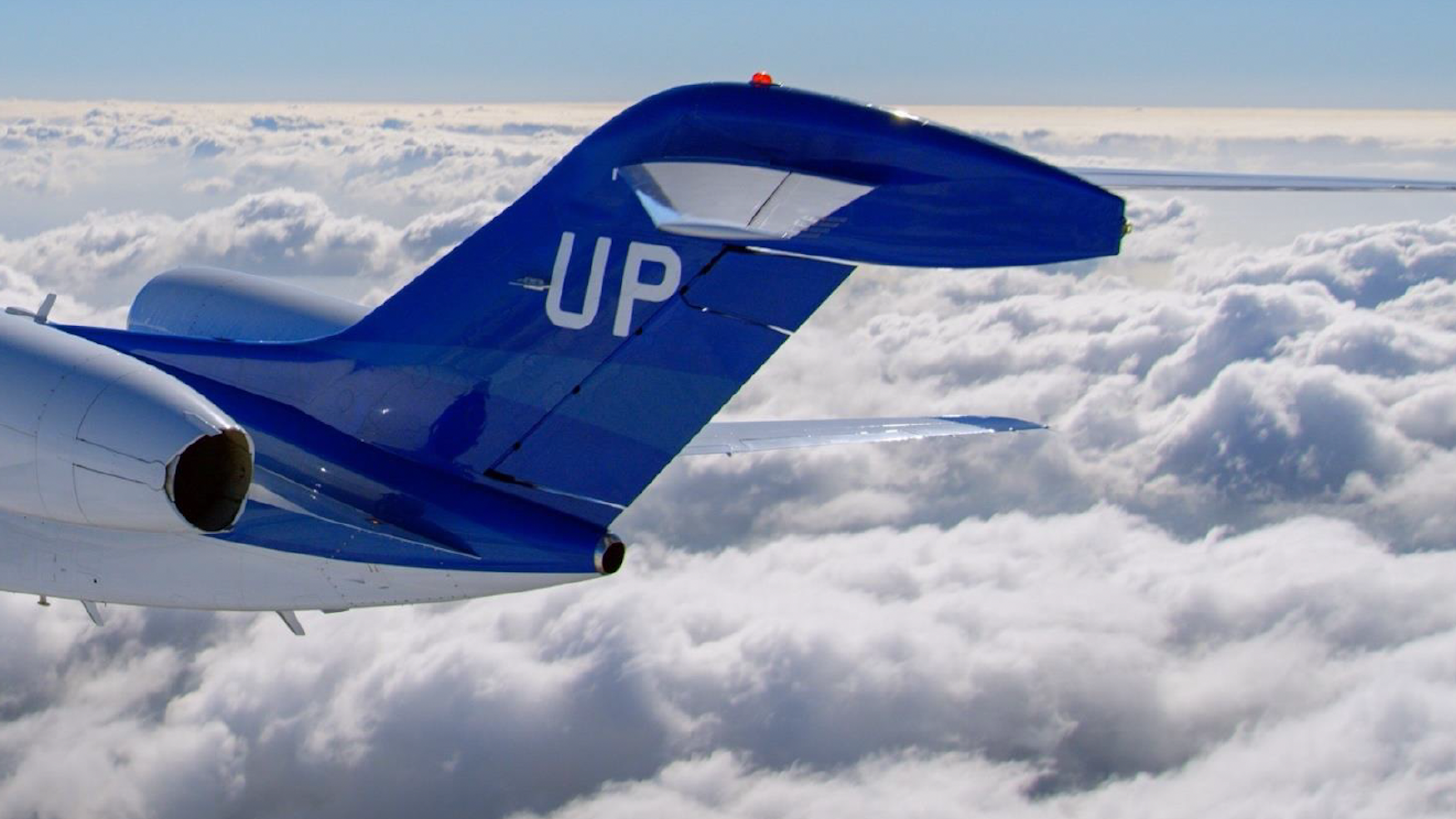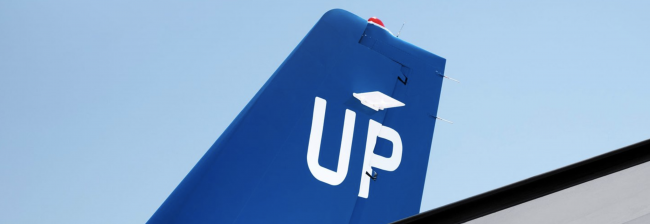
Delta Air Lines-backed Wheels Up says it is on target to have a positive adjusted EBITDA in 2024 despite lower revenue, fewer members.

Wheels Up executives say they are on track for a positive Adjusted EBITDA in 2024 while reporting $207 million in block sales during the fourth quarter of 2023.
Its block sales were the highest of the year (scroll down for table), up from $79 million in Q3 2023.
Still, the fund deposits were down from $346 million in Q4 2022 and a record $540 million in Q4 2021.
“…we are rebuilding our sales pipeline, restoring customer confidence, and are seeing strong momentum…”
– George Mattson, Wheels Up CEO
In 2021, Wheels Up benefited as other major jet card players, such as NetJets and Sentient Jet, stopped taking on new members.
Executives say the sequential increase in deposits for future flights reflects consumer confidence after the Delta-led $490 million investment that helped the 2013 start-up avoid bankruptcy.
Following its IPO in July 2021, Wheels Up beat revenue targets.
However, it struggled to integrate a half-dozen acquisitions as private aviation saw a spike in demand induced by the Covid pandemic.
As the member roster grew by 25% in 12 months, the flight provider struggled with reliability.
While competitors with a single fleet could better manage pandemic restrictions, including assigning replacement pilots after a positive Covid test or sourcing replacement aircraft after a mechanical, Wheels Up had five different operators it acquired. Each had its own separate operations center and dispatch.
Due to FAA regulations, each had to operate as a separate entity. However, ops finally consolidated into a central location in late 2022.
Last year, it opened a new operations center, now its headquarters in Atlanta.
READ: Why private aviation’s supply chain and labor crisis isn’t going away
Increased costs, including needing to use third-party providers to accommodate program customers with guaranteed availability and capped rates, pushed Wheels Up to a record loss of $555.5 million in 2022. That dropped to $487.4 million in 2023 despite a 20.9% revenue decline to $1.25 billion from $1.58 billion.
Full Year Adjusted EBITDA loss dropped from $185.3 million in 2022 to $145.9 million in 2023.
According to the 2023 Jet Card Report by Private Jet Card Comparisons, 61.1% of respondents who were Wheels Up customers said they had experienced delays, cancelations, and service issues.
It compares to 45.5% for the industry.
Flight delays, changes, cancelations, and declining customer service were the top reasons members were considering leaving (compared to increased prices for competitors).
Seeking to show the progress it has been making, Wheels Up again reported Flight Completion and On-Time Performance.
According to two charts published for this morning’s Investors Call, the now Atlanta-based company met its target of a 98% completion percentage (see below).

Its quarterly On-Time Performance beat its 85% target.
Wheels Up has been beating the target all year, although it has not provided specific numbers beyond a chart lacking full details (see below).

In terms of definitions, Flight Completion refers to the percentage of flights operated.
On-time performance measures the percent of flights that depart within 60 minutes of scheduled time, including air traffic control, weather, maintenance, and customer delays.
Wheels Up gives customers a one-hour grace period where it will hold the airplane in case they are late.
“In our first full quarter since the strategic investment, we have made strong progress on several key fronts. Operationally, we continue to drive performance and strengthen our team. Commercially, we are rebuilding our sales pipeline, restoring customer confidence, and are seeing strong momentum in our joint efforts with the Delta sales teams,” said George Mattson, Chief Executive Officer.
Mattson, a longtime Delta board member, was named CEO in September.
He replaced CFO Todd Smith, who had served as Interim CEO after Kenny Dichter resigned in May 2023.
Using the Delta sales team to prospect for business flying with the airline’s over 40,000 corporate accounts has been a key talking point since its Q1 2022 call.
Executives have not provided any numbers regarding new accounts won through the integration.
A spokesperson tells Private Jet Card Comparisons, “We don’t plan to disclose specifics but we are very happy with the engagements.”
Wheels Up’s strategy is to increase efficiency by moving from a predominantly leisure provider to a more balanced mix.
It also wants to reduce the percentage of revenue from customers with guaranteed rates.
READ: Everything you need to know about Wheels Up 2.0
During the call, Wheels Up also introduced a new metric, Flight Transaction Value. FTV reflects the gross value of charter flights sold via its Air Partner brokerage.
It shows gross – the end price charged to the consumer – instead of net revenue.
The net would have been the margin between what the flight was sold for and what Wheels Up paid to the actual charter operator.
Smith added, “We made significant progress over the past quarter to improve our business for a sustainable future. We are continuing to optimize our cost structure and fleet to focus on profitability. With improving liquidity in the fourth quarter and our partnership with Delta, we believe we are well positioned to continue to invest in our business for the long term.”
Smith said the decision to reduce its Primary Service Area and focus on value in the reduced PSA is paying off.
“We stopped selling the older and unprofitable nationwide guaranteed programs last June and are making substantial progress in migrating our flying to the newest program rules. Currently, less than 20% of our flight deferred revenue is on a pre-June 2023 rule set,” he noted.
Smith said that increased charter and corporate flying are providing “a strong tailwind to our adjusted contribution margin in the year ahead.”
READ: You’re fired! Are you an unprofitable private jet flyer?
Total Deferred Revenue (deposits from members for future flights) at the end of 2023 was $724 million, down year-over-year from $1.08 billion.
Wheels Up ended 2023 with $384 million in liquidity, up from $365 million in Q3.
READ: What happens to your jet card and private jet membership deposits?
The financial highlights are below.
| Period | Block Sales (in millions) |
| Q4 2023 | $207 |
| Q3 2023 | $79 |
| Q2 2023 | $96 |
| Q1 2023 | $100 |
| Q4 2022 | $346 |
| Q3 2022 | $151 |
| Q2 2022 | $333 |
| Q1 2022 | $175 |
| Q4 2021 | $540 |
| Q3 2021 | $172 |
| Q2 2021 | $116 |
| Q1 2021 | $69 |
Active members dropped back to the lowest number since the beginning of 2021.
It marked the fifth straight quarterly decline.
Active members at the end of Q4 stood at 9,947.
At its peak in Q3 2022, there were 12,668 active members.
| Period | Active Members |
| Q4 2023 | 9,947 |
| Q3 2023 | 10,755 |
| Q2 2023 | 11,639 |
| Q1 2023 | 12,285 |
| Q4 2022 | 12,661 |
| Q3 2022 | 12,668 |
| Q2 2022 | 12,667 |
| Q1 2022 | 12,424 |
| Q4 2021 | 12,040 |
| Q3 2021 | 11,375 |
| Q2 2021 | 10,515 |
| Q1 2021 | 9,896 |
The decline over the past six months was not unexpected.
As members in areas now not part of the current PSA use their legacy funds, flights are now priced dynamically instead of capped hourly rates if they remain with Wheels Up.
READ: Which private jet pricing method is best for you?
Mattson and Smith believe increases in business flights and on-demand charters via its Air Partner brokerage, combined with the reduced PSA, will drive profitability.
He and Smith also see international expansion opportunities via Air Partner.
Large parts of the transition are in the rearview mirror.
The management business was sold, and the aircraft sales unit was spun out to its management team. Its Avianis platform was licensed, reducing technology investment. The fleet is being scaled back. Unprofitable service areas have been eliminated, and now those legacy funds are being used. The company is increasingly relying on Delta’s marketing power.
Leadership is increasingly slanted to executives who come from Delta.
Delta CEO Ed Bastian has made it clear that he believes Wheels Up is a key element of his premium strategy.
Delta specifically cited its focus on growing premium revenue when announcing a $5.6 billion pre-tax profit for 2023 on $58 billion in revenue.
And while Wheels Up will be smaller in the near future, even after the reductions, it will be ranked as North America’s fourth-largest private jet operator for 2023.
The full-year annual report and financials are expected to be filed today after the market closes.
READ: A brief history of Airlines and Private Jet partnerships